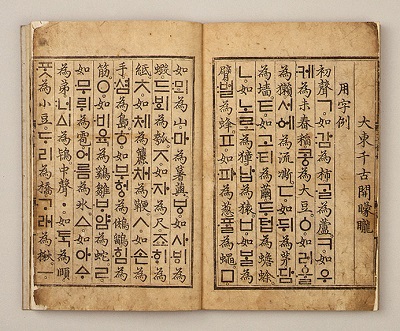[Aug] Hangeul manuscript to be sold as NFT
Date Aug 02, 2021
 A page of "Hunminjeongeum Haeryebon." Courtesy of Cultural Heritage Administration“Hunminjeongeum Haeryebon,” a valuable 15th century handbook of the Korean alphabet “Hangeul,” designated as National Treasure No. 70, will be sold as NFTs (non-fungible tokens). The announcement came recently from the Kansong Art Museum in Seongbuk District, Seoul, which holds an original copy of the manuscript in its collection.
A page of "Hunminjeongeum Haeryebon." Courtesy of Cultural Heritage Administration“Hunminjeongeum Haeryebon,” a valuable 15th century handbook of the Korean alphabet “Hangeul,” designated as National Treasure No. 70, will be sold as NFTs (non-fungible tokens). The announcement came recently from the Kansong Art Museum in Seongbuk District, Seoul, which holds an original copy of the manuscript in its collection.
This will be the first time that one of Korea’s National Treasures is minted and put up for sale as a digital asset. The art museum stated that it plans to turn the manuscript into limited edition NFTs, selling them to a total of 100 buyers for 100 million won (US$87,000) each.
NFT is a virtual asset that can represent any real-world objects – music, art, video, collectibles and in this case, cultural artifact – to create a unique digital certificate of ownership. The resulting image can then be sold and bought online, with the information about each transaction tracked via blockchain.
According to a report from DappRadar, NFT sales has risen to nearly $2.5 billion in the first half of 2021 around the globe. The phenomenon has gained huge popularity in the arts and culture sector over the last few years, prompting collectors and artists to realize the previously unrecognized value of the virtual market and its possible impact on future digital advances.
The cash-strapped museum explained that its decision to digitize the manuscript is an effort to venture into a new type of sponsorship and raise funds for its operating expenses and research into cultural assets. Hunminjeongeum Haeryebon was published in 1446 during the Joseon Dynasty (1392-1910) as part of King Sejong’s efforts to raise literacy by replacing the Chinese characters then in use with scientifically derived Hangeul letters.
The manuscript has been deemed one of the most historically significant pieces in Korea, with most copies lost during the Japanese colonial era (1910-1945).
The Cultural Heritage Administration (CHA) explained that it will review the case based on relevant laws, including the Cultural Heritage Protection Act, and examine how the digitization process can affect or alter the handbook’s current condition.
**If you have any questions about this article, feel free to contact us at kocis@korea.kr.**

The Ministry of Culture, Sports and Tourism's "Korea Here & Now" work can be used under the condition of "Public Nuri Type 1 (Source Indication)."




